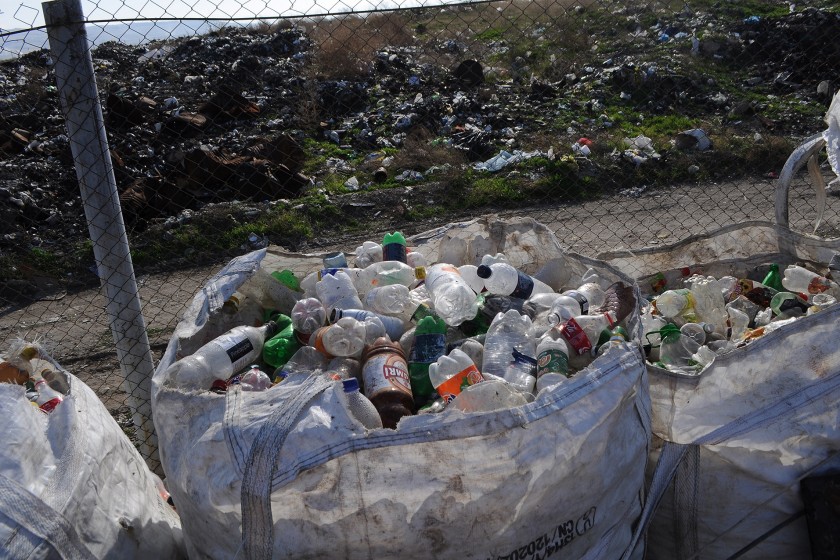
Solving Armenia’s Garbage Dilemma: 15 Communities Have Been Sorting Trash for Five Years
By Sara Petrosyan
15 communities in Armenia’s Ararat Province have been operating a collective garbage collection service for the past five years.
In 2010, the European Union allocated a 200,000 Euro grant to get the project started. Another 20% of financing was provided the communities included in the project called the “Vedi Inter-Community Union”.
With the funding, the union formed Clean Country Ltd. and purchased garbage collection trucks and trash bins. A five hectare parcel was allocated for a trash dump. 21 million AMD of the project’s budget went for utilities, an administrative building, and a fence around the site. The land was also tested for appropriateness.

Clean Armenia is the only company in Armenia that collects garbage in plastic bags. “We distribute green and black bags to residents. The green ones are for paper and plastics. The black ones are for mixed household trash. We collect the garbage according to schedule. Garbage trucks make the rounds in every community once or twice weekly. The bags are collected and new ones provided. We collect trash in the town of Vedi every day,” said Clean Country Director Yura Haroutyunyan.
The company sorts the trash but doesn’t recycle it. Haroutyunyan said that several impoverished families sort through the trash and for resale.

There have been improvements in trash collection in the communities involved over the past few years. But the situation isn’t totally satisfactory. Hetq photographed mounds of garbage in several of the communities. Nevertheless, it must be stressed that the situation in these communities greatly differs from other communities in Ararat Province. Furthermore, the garbage dump servicing the project communities is one of the few to be fenced. Here, the trash isn't burned but covered with soil.
“Sometimes fires break out spontaneously, but it isn’t a dump that is constantly smoking. Perhaps, fires are set accidentally or on purpose. Those looking for metal set fires to make their work easier,” said Haroutyunyan.

Some community heads confess that they couldn’t have provided garbage collection by themselves. Haroutyunyan says the same. “The composition of trash is very complex. Village garbage is one story, city garbage another. One community, on its own, cannot collect garbage like this. Today, they pay our company 1 million AMD per year. Individually, even if communities paid 2 million, they still couldn’t provide such service.”
When Hetq asked if providing joint garbage collection allowed the company to grow, Haroutyunyan said that the 4.2 -4.5 million AMD collected every year covers operating costs. “15% of the budget is allocated to providing residents with plastic bags. 2.2-2.5 million goes to salaries, and the rest is for equipment maintenance and operation. There is nothing left over. We are trying to cut expenses but we cannot increase revenues,” said Haroutyunyan.
He estimates that to improve service 250-280 drams must be collected from every resident. But socio-economic conditions prevent any increase in collection fees.
Since 2012 fees have been pegged at 150 drams per resident. Before, the rate was 500 drams per family. “There are communities where we continue to collect 500 drams per family. Community budgets pay us the difference since our contract is with them,” said Haroutyunyan.
He says that fee collection can also be improved. Many go uncollected. Haroutyunyan said that corporate and business accounts make up the shortfall.
“Many tell us not to distribute bags and thus cut costs. But we refuse because it is our trademark, a sign of our quality,” said the Clean Country director.
“Back in 2011 we understood that this dump wasn’t sufficient. Our aim is to recycle trash and not let it accumulate,” said Haroutyunyan.
The company is now building a recycling plant and has received a $50,000 grant from the U.N. Office in Armenia for the first stage. The money has gone towards purchasing land in Vedi for the plant. Construction is nearly half complete.
“We have plans to build a hot-house opposite the plant and to heat it with gases emanating from garbage recycling,” said Haroutyunyan.

Such a project will require a good deal of money. If it succeeds it will be the first recycling plant in Armenia to solve the age-old dilemma – what to do with all that garbage.
Garbage dumps will be a thing of the past.

Photos: Narek Aleksanyan
 Videos
Videos Photos
Photos




Write a comment